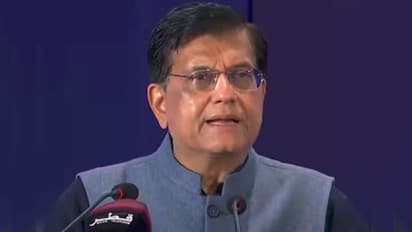Are we happy being delivery boys & girls: Piyush Goyal asks Indian startups to raise the bar, do better |WATCH

Synopsis
Union Minister Piyush Goyal, speaking at the second edition of the Startup Maha Kumbh on Thursday, touched on the nature and scope of Indian startups and urged them to think of big and innovative solutions
Are we just becoming part of the Gig Economy? Union Minister Piyush Goyal on Thursday touched on the nature and scope of Indian startups and urged them to think of big and innovative solutions. Goyal, who arrived in New Delhi to inaugurate the second edition of the three-day 'Startup Mahakumbh 2025', has India's startup model, expressing concern about India's reliance on gig jobs while China advances in deep-tech innovation.
Goyal questioned whether the country is content with low-paying delivery jobs instead of striving for significant technological advancements?
Are we going to be happy being delivery boys & Girls? - Piyush Goyal
Citing a presentation, Goyal said, 'Should we aspire to be delivery boys and girls, or will we be happy just being delivery boys and girls?' The presentation compared India's startup environment with that of China. Highlighting the differences between the two countries, the Commerce Minister argued that Indian startups are focusing more on food delivery and gig work rather than leading in tech innovation.
Goyal said, 'What are India's startups today? We are focusing on food delivery apps, turning unemployed youth into cheap labor so that wealthy people can get their food without leaving their homes.'
"I only wish they'd had more Indian investors, rather than the foreigners buying off all our startups. And yes, we need more Indian investors into the game. And look at what the other side is doing, robotics, automation, machine learning, preparing ourselves for 3d manufacturing, next gen factories that are more efficient and that compete with the rest of the world," he said.
The Union Minister said Indian startups need to be willing to evolve and not be afraid of competition.
India's position among startups in world?
Acknowledging India's position as the third-largest startup ecosystem in the world, Goyal said, 'We are very proud of what India has done, but are we still number 1 in the world? Not yet.' According to him, a major concern is the limited number of deep-tech startups in India. He said, 'Only 1,000 startups in India's deep-tech sector is a troubling situation.'
"I only wish they'd had more Indian investors, rather than the foreigners buying off all our startups. And yes, we need more Indian investors into the game. And look at what the other side is doing, robotics, automation, machine learning, preparing ourselves for 3d manufacturing, next gen factories that are more efficient and that compete with the rest of the world," he said.
'Aspire for bigger and better': Piyush Goyal asks Indian startups to raise the bar, go global
The Union Minister said Indian startups need to be willing to evolve and not be afraid of competition.
"We must learn (from other countries). We must be willing to evolve, we have to be able to learn, we want to aspire to be bigger and better and bolder. And we should not shy of the competition," he said.
Speaking of the nature of startups India is setting up, he said India needs to raise the bar and help prepare the future of the nation. "We need to invest heavily to become self-reliant, building chips, AI models which will prepare the nation for the future," he said.
"We need to go global. We need to think big; we need to be ambitious; we need to experiment. We need to go beyond the boundaries of our own thinking. Let's not limit ourselves with the past. Let us explore the unknown," he suggested.
Piyush Goyal appealed to the youth to focus more on innovation, moving away from e-commerce and service-based businesses. He urged entrepreneurs to think and plan for the long term. The Commerce Minister called for moving beyond traditional business models and leading the world in technology.
He asked, 'Do we just want to run shops to make our mark in the world?' He encouraged startups to dream big and bring new technologies.
On January 16, 2025, India marked nine years of Startup India, a transformative journey that began in 2016.
India has about than 1.6 lakh startups recognised by the Department for Promotion of Industry and Internal Trade (DPIIT). India has the third largest startup ecosystem.
Stay updated with the Breaking News Today and Latest News from across India and around the world. Get real-time updates, in-depth analysis, and comprehensive coverage of India News, World News, Indian Defence News, Kerala News, and Karnataka News. From politics to current affairs, follow every major story as it unfolds. Get real-time updates from IMD on major cities weather forecasts, including Rain alerts, Cyclone warnings, and temperature trends. Download the Asianet News Official App from the Android Play Store and iPhone App Store for accurate and timely news updates anytime, anywhere.